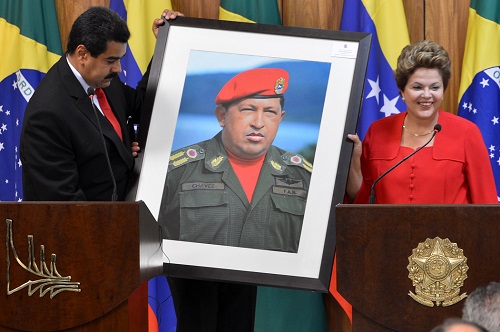
As Venezuela collapses, so do the dreams of countless Western socialists, who hailed the Bolivarian model as “twenty-first century socialism.” A number of prominent think tank leaders, including Acton Institute co-founder Fr. Robert Sirico, have commented on the ongoing turbulence inside the increasingly repressive and authoritarian regime of Nicolás Maduro.
To this end, they have produced a number of videos and podcasts discussing the uprisings and implosion of what was once one of South America’s most prosperous nations. Each performs a slightly different part of the autopsy, but all agree on one thing: The Left got it right; Venezuela truly is a model socialist nation.
“It’s an entirely man-made crisis,” said Madsen Pirie who, with Eamonn Butler, co-founded London’s Adam Smith Institute.
The nation’s GDP has virtually halved over five years and inflation has reached one million percent, he said in a video posted today. Significantly, he linked the failure, not to current president Nicolás Maduro but to the actions of the newly sainted Hugo Chavez.
“All of this has been caused by a failed ideology,” he said. “Socialism has been given one more go, and it has shown us all one more failure.”
Importantly, Ball explained how the actions of National Assembly President Juan Guaidó do not represent a coup but the actions of a constitutionally elected officer reversing a fraudulent election.
“I think the important point that has been made here is to connect this experiment over 16 years with real socialism,” Fr. Sirico said as he concluded Monday’s livestream broadcast. “This is socialism. This is not an aberration of socialism. It’s its logic being fulfilled.”
Hugo Chavez received global adulation when he began to refer to his economic policies as socialist. Jeremy Corbyn, who could be the next prime minister of our closest ally, insisted that Chavez “showed us that there is a different, and a better way of doing things. It’s called socialism.”
Perhaps most prominently Noam Chomsky, one of the most-cited thinkers in academia, hailed Caracas for pursuing “the creation of another socio-economic model.”
Some blame Maduro for abandoning Chavez’s policies – but the nation’s economic contraction began under Chavez, in 2009. He confiscated property, distorted price signals, and failed to diversify the economy away from oil extraction.
Bolivarian socialists, praised for providing universal health care and feeding the poor, cut imports of food and medicine 70 percent … even as production of their own anchor crops halved. “The minimum wage in October 2012 provided 60,000 of the cheapest calories,” wrote Kristian Niemietz of the Institute of Economic Affairs for CapX, “but by August 2018 this had decreased to a mere 200 calories.”
As with previous idols such as Cuba, some apologists blame U.S. sanctions against the nation. Yet the economy had already contracted one-third by the time the sanctions were imposed.
Mostly, the apologists simply went silent or changed their story. Now, Chomsky insists Venezuela never enacted real socialism. Among other things, Venezuela’s “state capitalist government” did not go far enough in imposing capital controls.
This follows a predictable pattern traced by Niemietz in a December episode of its podcast, “IEA Conversations: Live from Lord North Street.”
“You had exactly the same development,” he said. “About a decade of enthusiastic endorsement. Then a period of silence. Then a reinterpretation retroactively, ‘Oh that wasn’t socialism.’” He has carefully curated this trend in multiple articles for IEA’s blog. (If I may offer one addendum to Niemietz’s pattern: Economic interventionists always insist a given experiment failed because it did redistribute enough property. See the elite commentary on President Obama’s stimulus bill. The underlying logic of redistribution is not – and cannot be – questioned.)
The prevailing myth is that socialism is “a good idea badly done,” Niemietz said. He asking George Orwell, “Can you wrote Animal Farm Part II explaining why all those other socialist experiments in China and the rest of the Eastern Bloc and in North Vietnam and Cuba, why there were so many others and all of them turned out in a similar way?” (You can download that podcast here.)
It is precisely to avoid this question that socialists continually recast previous utopias as inevitable disappointments. In a new IEA podcast released today, Madline Grant of the Telegraph stated that Western socialists have largely transitioned from idolizing the South American model to hailing Nordic “socialism” in nations like Denmark. Yet Niemietz noted that they previously contrasted Venezuela with “social democracy” as practiced in Europe. (You can download that podcast here.)
All four videos and podcasts are worth your time, because they transmit a few salient truths:
- Economic power cannot be concentrated in the state’s hands without producing despotic political power;
- No human being is so devoid of the taint of sin as to be entrusted with that power;
- Prices cannot be subverted without consequence;
- Nations that ignore the foregoing lessons will face decline and collapse; and
- The intellectuals who cheered them on in the early stages will abandon them in order to preserve their own reputations.
These truths cannot be repeated too loudly or too often.
Ball had a crisp answer when Fr. Sirico asked, “What can we do to help?”
“Just retransmit the truth,” he said.
(Photo credit: Valter Campanato/ABr. This photo has been cropped. CC 3.0 Brazil License.)

